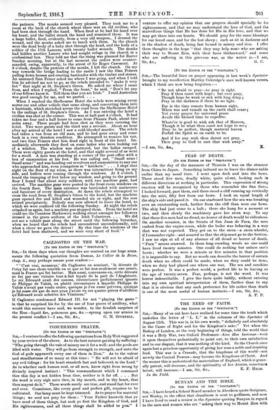FEAR OF DEATH.
ITO TITS EDITOR OP TEE "SPECTATOR"]
Sne,—On the day of the massacre of Tientsin I was on the steamer from China to Japan. Something induced me to leave the dinner-table earlier than my usual time. I went upon deck and into the bows. There stood five men, deadly white, quite sil ent, looking each in different directions at nothing in particular. This expression of strong emotion will be recognized by those who remember the San Siete. I looked forward, past them, and there stood a cliff running up vertically into the mist, fifty feet from our bows. I took an equal length of the ship's side and paced it. On our starboard bow the sea was breaking over an outstanding rock, further from the cliff than were our bows. The ship had just come to a halt ; there she hung for a moment or two, and then slowly the machinery gave her stern way. To say that those five men had no dread, no horror of death would be ridiculous. On another occasion, in the Straits of San Juan de Fuca, the men rushed from the engine-room, while the boiler was behaving in a way that was not expected. They got on to the stern—a stern-wheeler, if I remember right—and assured us that the ship must go to the bottom. I saw no sign at all of any absence of all dread or horror of death. "Fuca" means seaweed. In those long crawling weeds no one could have lived twenty minutes. One could do nothing but unlace one's boots ; whether we were a minute or five minutes in that position it is impossible to say. But no words can describe the horror of certain death when no effort could be made, when no duty could be done, when no duty had placed one where one was. The sea and sunshine were perfect. It was a perfect world, a perfect life to be leaving at the age of twenty-seven. Fear, perhaps, is not the word. It was horror indescribable. I give the facts quite baldly, without entering into my own spiritual interpretation of them, further than to say that it is obvious that any such preference for life rather than death is one of the most useful of human instincts.—I am, Sir, &e., A. F. P.






























 Previous page
Previous page